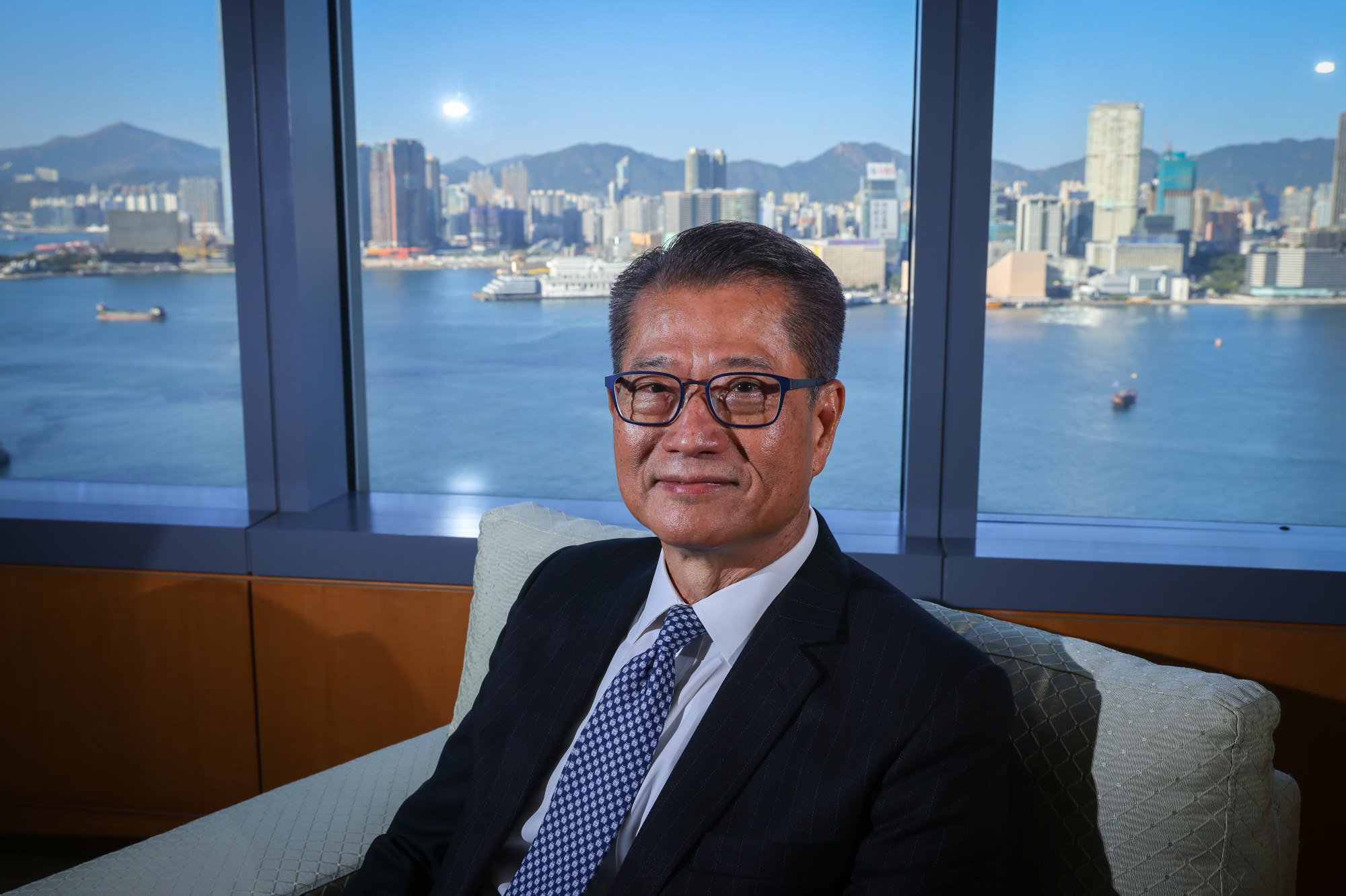
Hong Kong and other Greater Bay Area cities pledge more cooperation as Beijing’s cross-border powerhouse plan marks fifth anniversary
- Hong Kong Financial Secretary Paul Chan says stronger links between city’s financial sector and rest of Greater Bay Area being forged
- Guangdong party chief calls on bay area cities to join forces with Hong Kong and Macau to speed up creation of hub capable of fostering top talent
The officials were exploring ways to fine-tune Beijing’s plan to create a cross-border economic powerhouse by linking 11 cities and more than 86 million people on the fifth anniversary of the blueprint on Sunday.
The minister said during an interview with state broadcaster CCTV on Saturday that Hong Kong had delivered an “impressive report card” on bay area development over the past five years.
“The interconnection in the financial sector within the Greater Bay Area is further deepening and expanding, while industry-oriented innovation and technology is bringing new economic impetus and increment to Hong Kong,” he said.

Chan argued that Hong Kong’s ability to connect the mainland with the rest of the world was a major advantage, adding: “Different companies can bring in upstream, midstream and downstream companies in their respective categories to form an industrial chain. We will help them find companies to work with.”
The minister also hailed Qianhai, an emerging zone in Shenzhen with special policies for Hong Kong companies, as a “big breakthrough” that would help develop industries such as artificial intelligence and biomedicine.
“Our interaction and cooperation with Qianhai are booming,” he said. “Hong Kong’s role as a commercial hub can meet the financing needs of innovation and technology enterprises in the Greater Bay Area at different stages.”
Hongkongers waking up to bay area potential – but more needed, say experts
Speaking at a forum in Shenzhen, Chinese Communist Party chief for Guangdong province Huang Kunming said an integral part of the bay area vision was ensuring the network of mainland cities joined forces with Hong Kong and Macau to become a magnet for talented people and a place to forge their abilities.
“We must truly love our talent, cultivate them with all our heart, attract them with all our heart and use them with care,” he said. “We have to attract high-level, innovative talent from around the world … and better grab the initiative to innovate and develop.”
Guangdong Governor Wang Weizhong also called on Hong Kong and Macau to deepen collaboration in key areas such as industrial science and technology to make the bay area an “important power source that leads the country’s high-quality development”.
At the same event, Chief Secretary Eric Chan Kwok-ki said Hong Kong could turn scientific research and talent into developmental opportunities, noting the advantages of a talent partnership programme that launched in January.
The No 2 Hong Kong official added the city would host a conference on global talent and the bay area in May to explore the city’s role as a gateway for luring professionals.
Can Greater Bay Area lure foreign investors? What will make global firms bite?
On his blog, finance chief Chan also pointed to the launch of the next phase of the cross-border Wealth Management Connect scheme on February 26, saying it would increase personal investment limits, allow for greater policy flexibility in cross-border commerce and help people diversify their asset allocations.
Christopher Hui Ching-yu, the financial services and treasury secretary, noted the next phase of the scheme would increase the personal investment limit from 1 million yuan (US$140,410) to 3 million yuan and allow the participation of securities firms. Banks are already allowed to take part.
“As our country’s middle class continues to rise and their wealth accumulates, I believe there is a vast market,” Hui said in a radio interview.
He added he also wanted to boost the liquidity of digital renminbi in Hong Kong.
Andy Kwan Cheuk-Chiu, director of the ACE Centre for Business and Economic Research, said the bay area was currently one of the few ways for Hong Kong to easily tap growth opportunities given geopolitical tensions worldwide.
Hong Kong’s star shines as Greater Bay Area’s rich tap tax breaks, incentives
“It is very difficult to find business outside,” Kwan said. “But Hong Kong still has value for mainland China. It is still a financial centre, albeit regionally.”
Simon Lee Siu-po, an honorary fellow at the Asia-Pacific Institute of Business at the Chinese University of Hong Kong, said the bay area’s evolution had been undermined by the coronavirus pandemic and the challenges currently facing the mainland and the city.
He cautioned that the country’s excessive reliance on domestic consumption could lead to “cannibalisation” among the joined cities due to internal competition.
“In the long run, we still need to earn money from outside and should not totally rely on domestic consumption,” he said.
Headwinds for Hong Kong airport as bay area rivals eye bigger slice of pie
Meanwhile, Commissioner for Belt and Road Nicholas Ho Lik-chi, who oversees the city’s role in Beijing’s push for a trade-centred network, said authorities planned to help Hong Kong companies explore overseas opportunities, including by establishing free-trade agreements with member states such as Bahrain, Kuwait and Peru.
But Kwan warned: “Alternative economic engines, such as the Middle East, are necessary, but they may not be able to make up the gap left behind by American and European money.”








